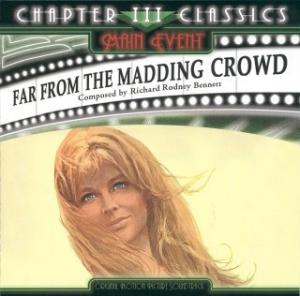This is truly a haunting score. How wonderfully Richard Rodney Bennett captured the atmosphere of Hardy's Wessex, weaving his themes from its lovely, wistful folk melodies. The music captures not only the peace and solitude of the beautiful landscape but also hints of something of the hard life of its occupants and their tragedies. The music is predominantly tender and plaintive - Bathsheba's theme in the title music (more passionately expressed in the Overture) and for 'Fanny and Troy'. Bathsheba's theme is developed most evocatively in 'Bathsheba and Briars' to suggest, first the sultriness of a summer landscape with birds wheeling above and then a suggestion of approaching turbulence as snare drum motives announce the disturbing presence of the bold grenadier (Terence Stamp) and his passion for Bathsheba (Julie Christie) and his hatred for her other suitor (Peter Finch). This cue is a tour-de-force of descriptive and dramatic writing. The 'Storm' sequence is also very forceful with more literal storm music juxtapositioned with an assertive muscular variation of one of the folk tunes
Folk tunes arranged by Bennett form an important part of the score, underlining, explaining and propelling the narrative. There are three included in the album: the well known 'Bushes and Briars' 'The Tinker's Song' 'The Bold Grenadier' but see Gary Dalkin's comments below.
It's good to welcome back this classic soundtrack recording.
Ian Lace

Gary S. Dalkin adds:-
This is a reissue of the original soundtrack LP to one of the best British films ever made, and the music by Richard Rodney Bennett is one of the best British film scores ever written. There are 13 tracks, which the track listing, irritatingly hidden away in the middle of the fold-out booklet, gets it wrong. There are four songs, not three. 'The Bold Grenadier' is sung by Isla Cameron, not Trevor Lucas - how anyone who had listened to the album could confuse the singers is a mystery, while 'I Sowed The Seeds of Love' is sung by Lucas, but is uncredited as if it were an instrumental. See my comments on Chapter III's reissue of Ron Goodwin's Where Eagles Dare for my grumbles with the generic packaging, but here we have booklet notes by reissue producer Amy Rosen which not only talk about 'Hardy's mythic town of Wessex', but of Bennett's career in the past tense. His most recent score is apparently Four Weddings and a Funeral (no mention of Swann, The Tale of Sweeny Todd, Gormenghast or more recent concert works); 'Bennett's much lauded, Academy Award nominated score to Far From the Madding Crowd was but one highlight of a prolific career.'
So what we have is half-a-full CD's worth of music in perfunctory and inaccurate packaging. Fortunately the music is wonderful and the sound is exception for its period. There is also much more music, and not just non-essential minor variations, than included in the suite recorded on Silva Screen's Cinema's Classic Romances (SILK 6018) and Chandos' The Film Music of Sir Richard Rodney Bennett (CHAN 9867).
The songs likewise, are not simply grafted on, but specifically arranged and recorded folksongs entirely appropriate to the context of the film. Further, Bennett weaves part of the melody of 'Bushes and Briars' into the fabric of the score, his arrangement of the song taking on orchestral colours bringing it far closer to the tradition of Vaughan-Williams and Gerald Finzi than the usually use of song in film. Imagine today, we would probably have Geri Halliwell warbling over the end credits.
Opening with unaccompanied flute, the title track has a pure and simple beauty. The melody transfers to oboe before string orchestra paints a portrait of the landscape of Wessex which is among the most memorable themes in all film music. 'Fanny and Troy' presents a companion melody in the same idiom though with a slightly warmer, more domestic sensibility. The music has elements in common with Bennett's Elegy for Viola and Orchestra (adapted from the score to Lady Caroline Lamb and recorded on the Chandos album). 'Bushes and Briars' is a beautifully arranged and performed version of a beautiful song. The same can be said of 'The Bold Genadier'. Unfortunately this fails to apply to the numbers delivered by Trevor Lucas. 'Tinkers Song' is a jaunty and irritatingly repetitive piece of nonsense which even at just over two minutes outstays its welcome. Now I shall probably get into trouble for saying this, being told I don't know what I am talking about, because Lucas was/is a member of the highly respected folk-rock band Fairport Convention, but the plain truth is he can barely sing. On his rendition of the sombre and lovely folk song 'I Sowed the Seeds of Love' his voice is weak and he simply cannot hit the high notes at all. The result is amateurish and painful. And no, I am not demonstrating a prejudice against folk music. I have a variety of folk albums in my collection, though none of them feature Trevor Lucas.
The rest of the music is wonderful, from the bleak and uncanny 'The Coffin', with is distant shade of Holst's Egdon Heath 'Homage to Thomas Hardy', through the expansive set-piece 'Bathsheba and Briars' to the 'Overture and Storm' which introduces the second half of the film after the intermission this is surely the definitive English pastoral soundtrack. Criticisms aside, the music is simply so good and the performances, Lucas aside, so rewarding that even if you have one or both of the recordings of the suite, you still need this disc in your collection. Quite simply, essential.
Gary S. Dalkin
 - music;
- music;
 - presentation.
- presentation.




